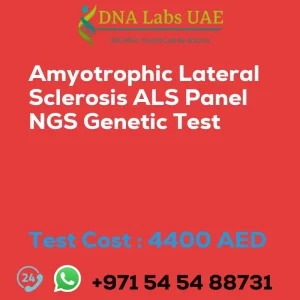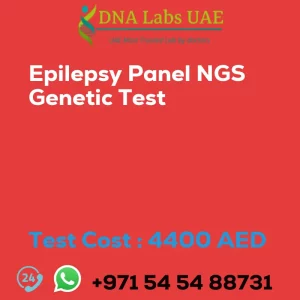RNF39 Gene Hippocampal longterm potentiation RFN39 related Genetic Test
Components: RNF39 Gene Hippocampal longterm potentiation RFN39 related Genetic Test
Price: 4400.0 AED
Sample Condition: Blood or Extracted DNA or One drop Blood on FTA Card
Report Delivery: 3 to 4 Weeks
Method: NGS Technology
Test type: Neurological Disorders
Doctor: Neurologist
Test Department: Genetics
Pre Test Information: Clinical History of Patient who is going for RNF39 Gene Hippocampal longterm potentiation, RFN39 related NGS Genetic DNA Test. A Genetic Counselling session to draw a pedigree chart of family members affected with RNF39 Gene Hippocampal longterm potentiation, RFN39 related.
Test Details: The RNF39 gene is responsible for encoding a protein called ring finger protein 39, which is involved in various cellular processes. One of its functions is believed to be related to hippocampal long-term potentiation (LTP), which is a cellular mechanism underlying learning and memory formation in the brain.
NGS genetic testing refers to next-generation sequencing, a high-throughput DNA sequencing technology that allows for the rapid and efficient analysis of multiple genes or even entire genomes. RFN39-related NGS genetic testing specifically focuses on identifying genetic variations or mutations in the RNF39 gene that may be associated with altered hippocampal LTP or other related conditions.
By analyzing the RNF39 gene through NGS, researchers or clinicians can identify any genetic variations that may be present in an individual’s DNA. This information can help in understanding the potential impact of these variations on hippocampal LTP and potentially provide insights into the individual’s risk for certain neurological conditions or cognitive abilities.
It is important to note that the field of genetics and genomics is still rapidly evolving, and the specific implications of RNF39 gene variations on hippocampal LTP and related conditions may not be fully understood. Therefore, further research and clinical validation are necessary to establish a clear link between RNF39 gene variations and specific outcomes.
| Test Name | RNF39 Gene Hippocampal longterm potentiation RFN39 related Genetic Test |
|---|---|
| Components | |
| Price | 4400.0 AED |
| Sample Condition | Blood or Extracted DNA or One drop Blood on FTA Card o |
| Report Delivery | 3 to 4 Weeks |
| Method | NGS Technology |
| Test type | Neurological Disorders |
| Doctor | Neurologist |
| Test Department: | Genetics |
| Pre Test Information | Clinical History of Patient who is going for RNF39 Gene Hippocampal longterm potentiation, RFN39 related NGS Genetic DNA Test A Genetic Counselling session to draw a pedigree chart of family members affected with RNF39 Gene Hippocampal longterm potentiation, RFN39 related |
| Test Details |
The RNF39 gene is responsible for encoding a protein called ring finger protein 39, which is involved in various cellular processes. One of its functions is believed to be related to hippocampal long-term potentiation (LTP), which is a cellular mechanism underlying learning and memory formation in the brain. NGS genetic testing refers to next-generation sequencing, a high-throughput DNA sequencing technology that allows for the rapid and efficient analysis of multiple genes or even entire genomes. RFN39-related NGS genetic testing specifically focuses on identifying genetic variations or mutations in the RNF39 gene that may be associated with altered hippocampal LTP or other related conditions. By analyzing the RNF39 gene through NGS, researchers or clinicians can identify any genetic variations that may be present in an individual’s DNA. This information can help in understanding the potential impact of these variations on hippocampal LTP and potentially provide insights into the individual’s risk for certain neurological conditions or cognitive abilities. It is important to note that the field of genetics and genomics is still rapidly evolving, and the specific implications of RNF39 gene variations on hippocampal LTP and related conditions may not be fully understood. Therefore, further research and clinical validation are necessary to establish a clear link between RNF39 gene variations and specific outcomes. |








